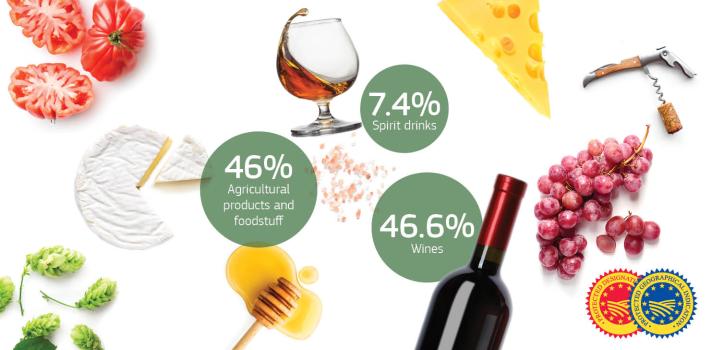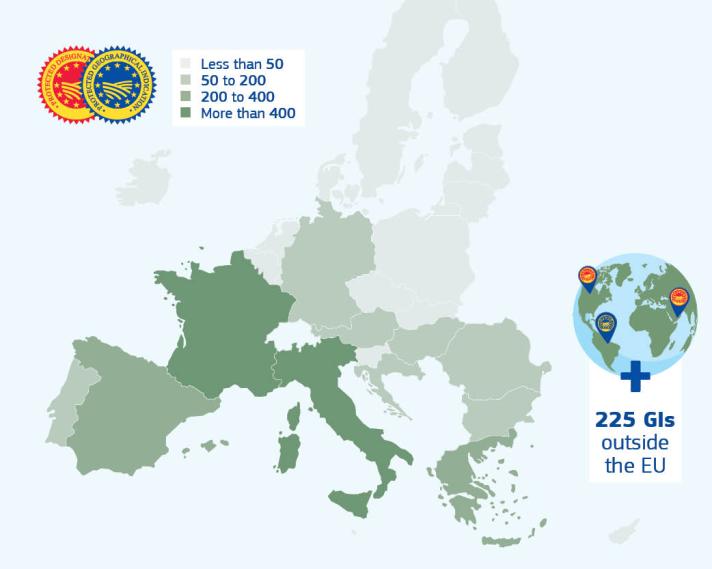
Geographical indications apply to various foodstuffs, agricultural products, wines and spirit drinks produced in identified regions. They protect the reputation of specific product names, the regional and traditional production processes, or other essential elements (such as local breeds or plant varieties) that shape culinary heritage throughout Europe.
Agri-food products and wines can be protected as Protected Designation of Origin (PDO) and Protected Geographical Indication (PGI), and spirit drinks as Geographical Indications (GI). EU symbols have been established to publicise these products. These symbols appear on product packaging, making it easier to identify these products on the market. They guarantee that an EU product is authentic, not an imitation or counterfeit, and serve to reinforce its national and international recognition.
EU quality schemes help protect the heritage of Europe’s agricultural sector and enhance consumer recognition of quality products all over the world.
Protected Designation of Origin and Protected Geographical Indication
A Protected Designation of Origin (PDO) is reserved for the names of products with the strongest link between its characteristics and its geographical origin. Raw materials and production steps all take place in the specific geographical area, and the final product is determined by these local ingredients and producers’ know-how.
A Protected Geographical Indication (PGI) also links a product to a geographical area, through its quality, characteristics and/or reputation. PGI registration requires at least one of the production, processing or preparation processes to take place in the specific region. However, the ingredients do not need to come from that region.
A Geographical Indication (GI) applies to spirit drinks distilled or manufactured in the specific geographical area.
Only foodstuffs and agricultural products are required to have the PDO/PGI symbols on their packaging. EU symbols are optional for wines and spirit drinks.
Representing EU’s diverse culinary heritage
GIs registered in the EU and beyond
Higher market value and economic weight
The respect of local traditions and know-how is an important factor when buying food products for a great majority of Europeans (from 56% to 97% depending on the country), as showed by the latest Eurobarometer on agriculture. Respondents are also more likely to buy food products that come from a geographical area that they know. In general, a study showed that the sales value of a product with a protected name was on average double than the sales value for a similar product without a certification. The value premium rate stood at 2.85 for wines, 2.52 for spirits and 1.5 for agricultural products and foodstuffs.
According to that same study, EU geographical indications accounted for an estimated sales value of € 74.76 billion in 2017, 6.8 % of the total sales value of the European food and drink sector estimated at €1,101 billion in 2017. Wines represented more than half of this value (€39.4 billion), agricultural products and foodstuffs 35% (€27.34 billion), and spirit drinks 13% (€10.35 billion).
Geographical indications are sold mainly on national markets (58% of their sales value). The rest of sales is equally divided between the EU market and outside of the EU.
Products with a registered name represent 15.4% of the total EU agri-food exports. Wines remain the most important product both in terms of total sales value (51%) and extra-EU trade (50%). Beyond its borders, the EU takes many steps to protect product authenticity and ensures that European quality products are recognised throughout the world. GI protection helps combat counterfeited products, which threaten the reputation of authentic, local and regional products and the livelihoods of their producers.
Details
- Publication date
- 23 February 2023
- Author
- Directorate-General for Agriculture and Rural Development
- Location
- Brussels



